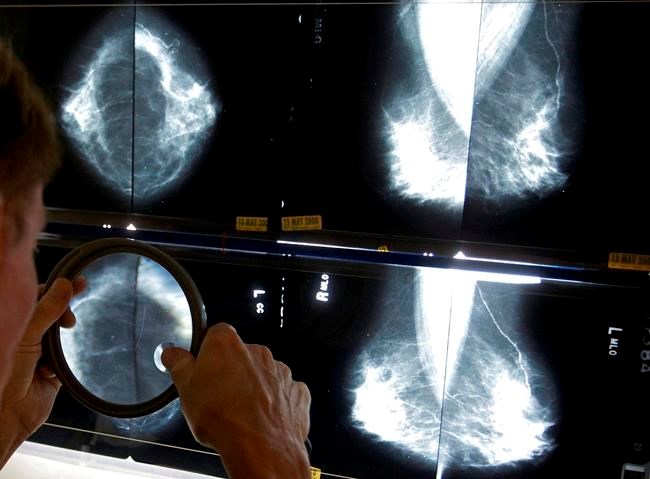TORONTO — Doctors in Ontario are seeing more advanced cases of breast cancer after 400,000 fewer mammograms were performed in the province during the COVID-19 pandemic, the Ontario Medical Association said Wednesday.
Although screenings have since returned to normal levels, the organization warned that the temporary decrease in testing has led to many cases of the disease being diagnosed at later stages.
Dr. Rose Zacharias, the association's president, said mammogram screening is the best method to detect breast cancer early, when it is less likely to have spread to other parts of the body.
"Some women are being diagnosed with bigger lumps and more advanced stage cancer, meaning the treatment is much more complicated," she said at a news conference.
Zacharias said cancer patients are waiting longer now for treatment, including surgery, compared to pre-pandemic times, and that urgent measures are needed to clear the surgical backlog and improve wait times.
Millions of medical appointments – including surgeries and procedures, screening tests, and visits to doctors – were delayed during the pandemic as the province shored up healthcare resources to respond to the virus.
Dr. Timothy Hanna, a radiation oncologist and associate professor at Queen’s University Cancer Research Institute’s Division of Cancer Care and Epidemiology, said screenings for all types of cancers dropped by 42 per cent during the first year of the pandemic in Ontario.
"This is certainly a system-wide issue, whose consequences are now emerging, and certainly requires action," he said. "The longer wait for treatment, the worse impact on survival. We have seen the same pattern for other cancers."
Hanna said he has witnessed more later stage cancers recently.
"I saw a wave of more advance cancers that I think were linked to delays in diagnosis," he said.
Dr. Jean Seely, a radiologist and the head of the Breast Imaging Section of the Department of Medical Imaging at the Ottawa Hospital, said screenings were stopped only for three months during the beginning of COVID-19 at the facility but the effect has been severe.
"We are now seeing more women are presenting because of the symptoms of breast cancer, instead of when they are found by screening," she said.
"The delays in screening are leading to poor outcomes for patients and they are affecting their long-term survival."
Seely said that with 400,000 fewer mammograms, an estimated 2,800 women may have not been diagnosed on time.
Before the pandemic, mammogram screening detected about half of breast cancer cases at the Ottawa Hospital, Seely said. That number dropped to less than one-third during the pandemic.
Dr. Erin Cordeiro, a breast surgical oncologist at the Ottawa Hospital and medical director of its Breast Health Centre, said the wait time for many cancer surgeries is four to six weeks, while the wait for prophylactic and delayed reconstruction surgeries is over a year.
"This time waiting for testing and surgery is obviously incredibly stressful for patients and their families."
This report by The Canadian Press was first published Oct. 11, 2022.
Sharif Hassan, The Canadian Press
Note to readers: This is a corrected story. An earlier version included an incorrect wait time for cancer surgeries.

